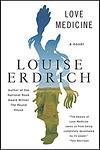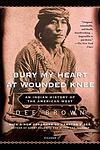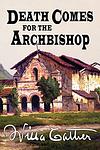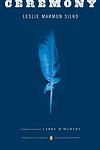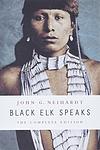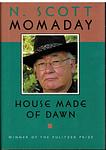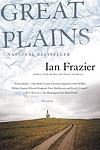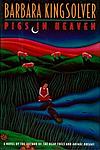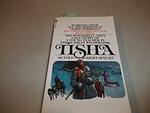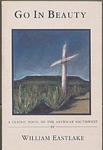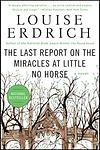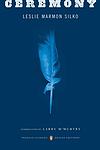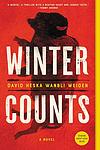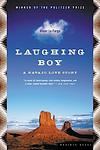The Greatest American "Native American" Books of All Time
Click to learn how this list is calculated.
This list represents a comprehensive and trusted collection of the greatest books. Developed through a specialized algorithm, it brings together 300 'best of' book lists to form a definitive guide to the world's most acclaimed books. For those interested in how these books are chosen, additional details can be found on the rankings page.
Genres
Countries
Date Range
Reading Statistics
Click the button below to see how many of these books you've read!
Download
If you're interested in downloading this list as a CSV file for use in a spreadsheet application, you can easily do so by clicking the button below. Please note that to ensure a manageable file size and faster download, the CSV will include details for only the first 500 books.
Download-
1. Love Medicine by Louise Erdrich
"Love Medicine" is a novel that explores the lives of several generations of a Native American family living on a reservation in North Dakota. The narrative is presented through a series of interconnected stories, each told from the perspective of different family members, and spans over 60 years, from 1934 to 1999. The book explores themes of love, family, identity, and the struggle between tradition and modernity. It provides a deep and poignant look into the complexities of Native American life and culture, and the challenges faced by the community.
-
2. Lonesome Dove by Larry McMurtry
The book tells the story of two retired Texas Rangers who embark on a perilous cattle drive from Texas to Montana in the 1870s. The narrative focuses on the duo's adventures and the characters they meet along the way, including a variety of outlaws, Indians, and settlers. This epic tale of the Old West explores themes of friendship, unrequited love, and the harsh realities of frontier life.
-
3. Bury My Heart at Wounded Knee by Dee Alexander Brown
This book is a compelling historical narrative that chronicles the systematic decimation of Native American tribes in the United States during the late 19th century. The author uses council records, autobiographies, and firsthand descriptions to provide a detailed account of the battles, massacres, and broken treaties that led to the destruction of the Native American way of life. The book centers on significant events such as the Battle of Little Bighorn and the Wounded Knee Massacre, offering a voice to the often overlooked Native American perspective.
-
4. Death Comes for the Archbishop by Willa Cather
This novel follows the life of a Catholic bishop and a vicar as they attempt to establish a diocese in New Mexico Territory. The story highlights their struggles and triumphs over the course of 40 years, dealing with the harsh landscape, cultural differences, and the challenges of faith. It also explores the history and culture of the Southwest, including the influence of Mexican and Native American traditions.
-
5. Ceremony by Leslie Marmon Silko
"Ceremony" is a novel that explores the life of Tayo, a World War II veteran of mixed Laguna Pueblo and white heritage. After returning from the war, Tayo struggles with post-traumatic stress disorder and alcoholism. The novel charts his journey towards healing, which involves embracing his Native American heritage and the traditional ceremonies of his people. Along the way, he must confront racism, poverty, and the destructive forces of Western culture, ultimately finding solace and redemption in the ancient rituals and wisdom of his ancestors.
-
6. Black Elk Speaks by John G. Neihardt
"Black Elk Speaks" is a profound narrative that recounts the life of a Native American medicine man from the Oglala Lakota tribe. It provides a unique perspective on the Lakota people's history and culture, their spiritual beliefs, and the impact of westward expansion on their way of life. The book also delves into the protagonist's personal spiritual visions, which he believes have significant prophetic and healing powers. The narrative is a poignant exploration of the clash between cultures and the devastating effects of colonization on indigenous peoples.
-
7. House Made of Dawn by N. Scott Momaday
The novel delves into the life of a young Native American man named Abel who returns home to his New Mexico Pueblo reservation after serving in World War II. Struggling with the trauma of war and the cultural dislocation caused by years away from his traditional tribal life, Abel tries to find his identity and place in a world that is torn between ancient tribal traditions and the modern white society. His journey of self-discovery and redemption is poignantly narrated, highlighting the struggles faced by Native Americans in the contemporary world.
-
8. Great Plains by Ian Frazier
"Great Plains" is a travelogue that takes readers on a journey through the vast expanse of the American Great Plains, exploring its history, geography, and culture. The author travels from North Dakota to Texas, delving into the history of Native Americans, pioneers, and outlaws. The book provides a detailed account of the region, its people, and its significance in shaping the American West, offering a vivid portrait of the landscape and its influence on the country's identity.
-
9. Mean Spirit by Linda Hogan
"Mean Spirit" by Linda Hogan is a gripping novel set in 1920s Oklahoma during the oil boom, where greed and violence run rampant. The story follows the lives of several interconnected characters, including members of the Osage Nation who are targeted for their newfound wealth and forced to confront a sinister conspiracy. As the tension escalates, the characters must navigate a treacherous landscape of corruption, racism, and murder, ultimately revealing the devastating consequences of unchecked power and the resilience of the human spirit.
-
10. The Round House by Louise Erdrich
A teenage boy navigates the complexities of life after his mother is brutally attacked on their reservation in North Dakota. As the legal system fails to bring justice due to jurisdictional issues, the boy takes matters into his own hands. The novel explores themes of tribal law, justice, and the transition into adulthood, all set against the backdrop of Native American culture and history.
-
11. The Absolutely True Diary of a Part-Time Indian by Sherman Alexie
The book is a semi-autobiographical novel that follows a Native American teenager who leaves his school on the Spokane Indian Reservation to attend an all-white high school in a neighboring town. The protagonist grapples with his own identity, the perceptions and prejudices of his new classmates, and the harsh realities of life on the reservation. Throughout the story, he uses humor and his passion for drawing cartoons to navigate the challenges he encounters.
-
12. There There by Tommy Orange
"There There" by Tommy Orange is a powerful and poignant novel that follows the lives of twelve Native American characters living in Oakland, California. As their stories intertwine and converge, the novel explores themes of identity, community, and the effects of historical trauma on Native American people. Through vivid and lyrical prose, Orange gives voice to a group of individuals who have long been marginalized and overlooked in American society, creating a compelling and unforgettable portrait of contemporary Native American life.
-
13. This Hallowed Ground by Bruce Catton
"This Hallowed Ground" is a comprehensive, detailed account of the American Civil War, from its origins to its aftermath. The book provides a vivid narrative of the battles, political events, and key figures of the war, skillfully blending historical facts with engaging storytelling. The author's perspective as a historian and journalist brings the era to life, offering readers an in-depth understanding of this pivotal period in American history.
-
14. Pigs in Heaven by Barbara Kingsolver
This novel follows the story of a young Cherokee girl and her adoptive mother. When the mother's right to custody is challenged by the Cherokee Nation, she takes her daughter and flees, sparking a nationwide manhunt. The narrative explores themes of cultural identity, belonging, and the meaning of family, while also delving into the legal and ethical complexities of Native American adoption laws.
-
15. The Education of Little Tree by Forrest Carter
The book is a heartwarming story of a young orphan boy of mixed ancestry who is raised by his Cherokee grandparents in the Appalachian Mountains during the Great Depression. His grandparents teach him the Cherokee way of life, including their spiritual beliefs, love for nature, respect for all living things, and the importance of tolerance and understanding. Despite the hardship and prejudice they face, they impart wisdom, love, and a unique perspective on life to the young boy.
-
16. Tisha by Robert Specht
"Tisha" is a biographical novel based on the true story of a young woman who moves to the Alaskan wilderness in the 1920s to become a teacher. The protagonist faces numerous challenges including harsh weather, isolation, and cultural differences, but remains steadfast in her commitment to educate the children in her care. The story also explores her fight against racial prejudice in the community, as well as her love affair with a half-Native man.
-
17. Follow the River by James Alexander Thom
"Follow the River" is a historical novel based on the true story of Mary Ingles, a woman who was captured by Shawnee Indians in 1755 during the French and Indian War. After being taken to Ohio, Mary, who was pregnant at the time of her capture, gives birth and is subsequently separated from her baby. Despite the harrowing circumstances, she manages to escape with another woman. The narrative follows her perilous 1,000-mile journey through the wilderness, back to her home in Virginia, showcasing her resilience, courage, and unwavering determination.
-
18. Go in Beauty by William Eastlake
"Go in Beauty" is a novel that explores the complexities of human relationships, love, and loss against the backdrop of the Navajo Indian reservation in New Mexico. The protagonist, a New York journalist, moves to the reservation after his wife's death and becomes entangled in a love triangle with two local women. The book delves into themes of cultural clash, isolation, and the search for meaning and redemption, all set against the stark and beautiful landscape of the American Southwest.
-
19. The Last Report on the Miracles at Little No Horse: A Novel by Louise Erdrich
The novel presents the story of Father Damien Modeste, a beloved figure who has served the Ojibwe Native American community at Little No Horse for over a century. As death approaches, Father Damien pens a letter to the Pope revealing his true identity; he is a woman named Agnes DeWitt who adopted the disguise of a priest after the real Father Damien died. The narrative explores themes of faith, identity, and the often complex relationship between Native American communities and the Catholic Church.
-
20. The Almanac of the Dead by Leslie Marmon Silko
"The Almanac of the Dead" is a complex narrative that explores the histories and struggles of indigenous peoples in the Americas, particularly in the Southwestern United States and Central America. The story is centered around a 500-year-old manuscript known as "the almanac," which prophesizes a massive, revolutionary upheaval led by the indigenous people against the oppressive forces of capitalism and colonialism. The novel delves into themes of resistance, survival, and the power of storytelling, weaving together a multitude of interconnected narratives and characters.
-
21. Collapse by Jared Diamond
"Collapse" is an exploration of why certain societies throughout history have thrived while others have deteriorated and collapsed. The book delves into environmental problems, climate change, rapid population growth, and unwise political decisions as factors that contribute to the downfall of a civilization. The author uses examples from history such as the Mayans, the Vikings in Greenland, and modern examples like Rwanda and Haiti, to illustrate his points. It serves as both a historical analysis and a warning for modern societies to learn from the past in order to avoid a similar fate.
-
22. Slavery by Another Name by Douglas A. Blackmon
The book explores the concept of "neoslavery," which entrapped thousands of African Americans in the South in a system of forced labor after the Civil War. This system was perpetuated by local laws, racial prejudice, and economic manipulation, where black men were arrested on false charges, then sold to companies as cheap labor. The book illuminates the forgotten history of this "age of neoslavery" that persisted into the 20th century and its profound impact on the racial disparities that exist today.
-
23. The Wordy Shipmates by Sarah Vowell
"The Wordy Shipmates" is a historical narrative that explores the journey and lives of the Massachusetts Bay Colonists, who left England in the 1630s in pursuit of religious freedom in America. The book delves into the paradoxes of these Puritans, who were both freedom seekers and authoritarians, and their influence on American identity. It also provides a detailed look at their relationships, conflicts, and the hardships they faced, all set against the backdrop of their religious and political beliefs.
-
24. Winter Counts by David Heska Wanbli Weiden
"Winter Counts" is a gripping and thought-provoking novel set on the Rosebud Indian Reservation in South Dakota. The story follows Virgil Wounded Horse, a local enforcer who takes justice into his own hands when the legal system fails his community. When his nephew becomes entangled in the dangerous world of drug trafficking, Virgil embarks on a mission to protect his family and seek retribution. Through its powerful narrative and exploration of Native American culture, the book sheds light on the complexities of modern-day reservation life and the struggle for justice in an unjust world.
-
25. Laughing Boy by Oliver La Farge
"Laughing Boy" is a novel set in the early 20th century that explores the life of a young Navajo man who falls in love with a beautiful, educated woman from his tribe. The narrative delves into their relationship, the clash of traditional and modern cultures, and the struggle for identity amidst societal changes. The story portrays the protagonist's journey towards self-discovery and his struggle to reconcile his love for the woman with his commitment to his tribe's customs and traditions.
Reading Statistics
Click the button below to see how many of these books you've read!
Download
If you're interested in downloading this list as a CSV file for use in a spreadsheet application, you can easily do so by clicking the button below. Please note that to ensure a manageable file size and faster download, the CSV will include details for only the first 500 books.
Download